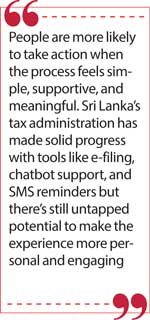Sunday Feb 22, 2026
Sunday Feb 22, 2026
Wednesday, 13 August 2025 00:28 - - {{hitsCtrl.values.hits}}

Interest develops when people see how taxes relate to their everyday lives
 In Sri Lanka, the tax conversation has long centred on enforcement; penalties, audits, and the fear of getting it wrong. But this approach overlooks a powerful truth: most people don’t comply because they’re afraid, they comply when they believe. Around the world, a new wave of tax thinking is emerging, grounded not in threats but in trust. It draws on psychology, behavioural science, and local storytelling to shift the focus from force to fairness, from pressure to participation. This isn’t just better messaging, it’s a deeper transformation of how governments connect with citizens, turning tax from a demand into a shared commitment.
In Sri Lanka, the tax conversation has long centred on enforcement; penalties, audits, and the fear of getting it wrong. But this approach overlooks a powerful truth: most people don’t comply because they’re afraid, they comply when they believe. Around the world, a new wave of tax thinking is emerging, grounded not in threats but in trust. It draws on psychology, behavioural science, and local storytelling to shift the focus from force to fairness, from pressure to participation. This isn’t just better messaging, it’s a deeper transformation of how governments connect with citizens, turning tax from a demand into a shared commitment.
Closing Sri Lanka’s tax gap and building a stronger revenue foundation calls for more than just technical upgrades. While modernising tax systems is essential, it’s only part of the solution. What’s just as important is rebuilding the relationship between citizens and the state through meaningful stories, shared experiences, and emotional connection. The AIDA framework: Attention, Interest, Desire, and Action, offers a useful path to engage people, but it can’t work in isolation. To truly change behaviour, it must be woven together with behavioural science and community-driven communication. This article explores how Sri Lanka can make that shift by putting people at the heart of its tax culture.
Applying AIDA to tax compliance: Selling a civic duty, not a product
Unlike consumer goods or services, tax compliance isn’t something people choose for personal benefit, it’s a civic obligation. Yet, the AIDA marketing framework; Attention, Interest, Desire, and Action, can still be powerfully applied to reshape how people perceive and engage with taxes. By treating tax messaging more like storytelling than instruction, governments can inspire voluntary compliance through emotional connection rather than enforcement.
Grabbing attention begins with storytelling. Picture a short video of a schoolgirl in Moneragala holding her first English book in a library built with tax funds, or a bus driver in Ampara receiving critical medical care at a state hospital. These aren’t just touching moments, they’re tangible examples of how well-used taxes can transform lives.
Interest develops when people see how taxes relate to their everyday lives. This doesn’t require lengthy reports or complex data. Instead, bite-sized content like animations, TikToks, or WhatsApp clips in Sinhala and Tamil can clearly show where their money goes. A simple 30-second video illustrating how a few rupees from fuel purchases fund road repairs can turn abstract policy into something relatable.
Desire follows when people begin to see tax not as a burden, but as a way of contributing to the greater good. Campaigns with slogans like “My share, Our future” can link tax compliance to visible outcomes clean water, better schools, and accessible healthcare.
 Finally, people are more likely to take action when the process feels simple, supportive, and meaningful. Sri Lanka’s tax administration has made solid progress with tools like e-filing, chatbot support, and SMS reminders but there’s still untapped potential to make the experience more personal and engaging. Imagine opening an app after filing your taxes and seeing a message: “Thanks to you taxpayer, three classrooms at Landegama Vidyalaya in the Badulla District now have electricity.” Picture a friendly progress bar encouraging you through each step, turning a routine task into a small achievement. And at the end, you hear from a real teacher or doctor, sharing how your contribution makes their work possible. This is how we move beyond transactions by turning taxpaying into a moment of connection, purpose, and national pride.
Finally, people are more likely to take action when the process feels simple, supportive, and meaningful. Sri Lanka’s tax administration has made solid progress with tools like e-filing, chatbot support, and SMS reminders but there’s still untapped potential to make the experience more personal and engaging. Imagine opening an app after filing your taxes and seeing a message: “Thanks to you taxpayer, three classrooms at Landegama Vidyalaya in the Badulla District now have electricity.” Picture a friendly progress bar encouraging you through each step, turning a routine task into a small achievement. And at the end, you hear from a real teacher or doctor, sharing how your contribution makes their work possible. This is how we move beyond transactions by turning taxpaying into a moment of connection, purpose, and national pride.
Still, while AIDA provides a helpful framework for crafting effective communication, it isn’t enough on its own. It shows us how to shape the message but not how to change the deeper beliefs and behaviours that drive compliance. That’s where behavioural science becomes essential.
The psychology behind tax behaviour
The Theory of Planned Behaviour helps us understand why people pay taxes. It shows that three things matter: what they think about taxes, what they believe others are doing, and whether they feel able to pay. For example, a young business owner in Hambantota knows taxes support public services. But if none of his friends file taxes and the online system is confusing, he might not try to file returns and do tax payments. However, if he sees local businesses proudly sharing “I filed” badges on social media and gets a simple video guide in Sinhala, Tamil, and English, he will feel more confident. So that the government and tax administration should focus on helping people feel capable and proud to be part of a shared effort, not just telling them to pay taxes.
Nudging: Small hints, big results
Behavioural science shows that small nudges, subtle ways of presenting choices can have a powerful effect on behaviour. They don’t limit freedom or change rewards but gently encourage people to make better decisions. Imagine getting a message like: “80% of taxpayers in your area have already filed on time. Join them and submit your return before November 30.” Or think of a tax form that comes with pre-filled information, a progress tracker, and green checkmarks as you complete each step. These simple design features make the process easier and more satisfying. It’s time to bring these smart tools into our tax system.
Relatable voices, real impact
The messenger can be just as important as the message itself. Psychologist Robert Cialdini highlights three key factors that influence how people respond:
Social proof – People follow what others like them are doing.
Authority – Messages from respected figures carry more influence.
Reciprocity – Feeling appreciated makes people more willing to give back.
Picture a teacher in rural village sharing how tax-funded repairs made her classroom safer, a popular YouTuber creating a fun video guiding gig workers on filing taxes, or a village monk likening paying taxes to “dāna,” a generous act for the community. These messages resonate because they come from familiar, trusted voices not just officials.
Rather than relying only on top-down campaigns, we can strengthen trust by engaging local communities: posters at rural post offices featuring families who filed taxes, a cricket star thanking taxpayers after a big win, or mobile booths with games and prizes at village carnival to raise tax awareness. These approaches make the conversation about taxes more personal and relatable.
From campaigns to conversations: Making tax everyone’s business
The most powerful communication doesn’t always come from the top it, comes from the ground up. Communication for Development (C4D) is all about participation, dialogue, and shared ownership. Instead of simply telling people what to do, it invites communities to be part of the solution.
In Sri Lanka, this could mean school tax clubs where students make videos showing how taxes support their learning. Or village street theatre and puppet shows that bring tax-funded services to life. It might involve women’s groups discussing how improved roads and clinics are connected to local tax efforts, or appreciation days at government offices where taxpayers are thanked with small tokens of gratitude.
When people are included and heard, they become more than just taxpayers—they become champions of the system. They contribute not out of obligation, but because they believe in what their taxes can achieve.
Turning tax into a shared promise
Creating a stronger tax culture in Sri Lanka takes more than new technology or tougher rules, it requires a deeper transformation in how people think and feel about taxes. This means shifting from one-way commands to two-way, people-focused communication. Marketing tools like AIDA show us how to capture attention. The Theory of Planned Behaviour explains what drives decisions. Nudges help make the process easier. Cialdini’s principles guide how to build influence and communication for development reminds us that lasting change starts with local voices and shared ownership.
By bringing these ideas together, Sri Lanka can move away from a tax system rooted in fear and move toward one grounded in fairness, respect, and shared purpose. The real question isn’t just, “Did you file your taxes?” It becomes, “Do you see yourself as part of something bigger?”
When the answer is yes, tax compliance isn’t a burden, it’s a sign of trust.
(The writer is Deputy Commissioner General, Inland Revenue Department.)